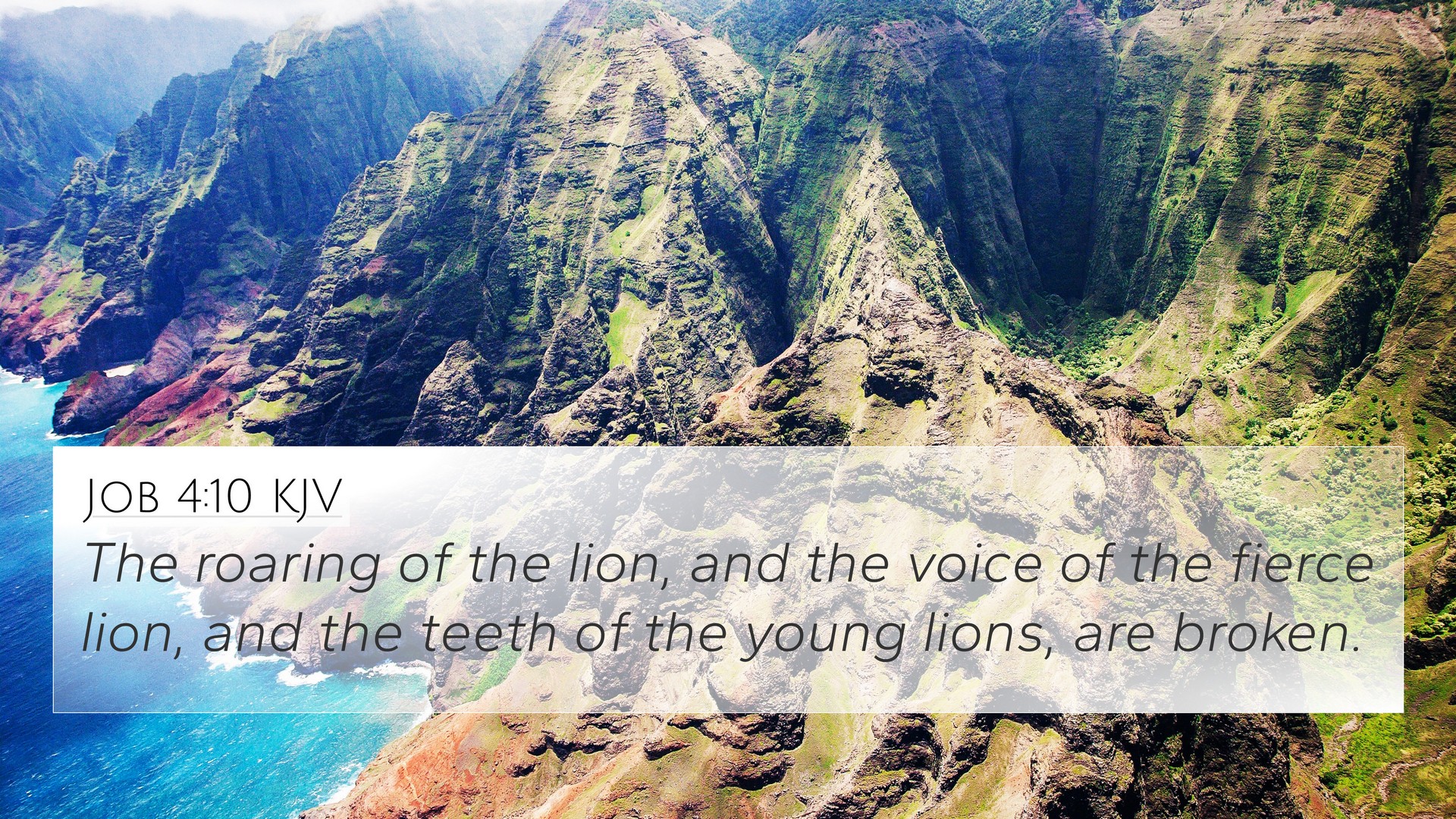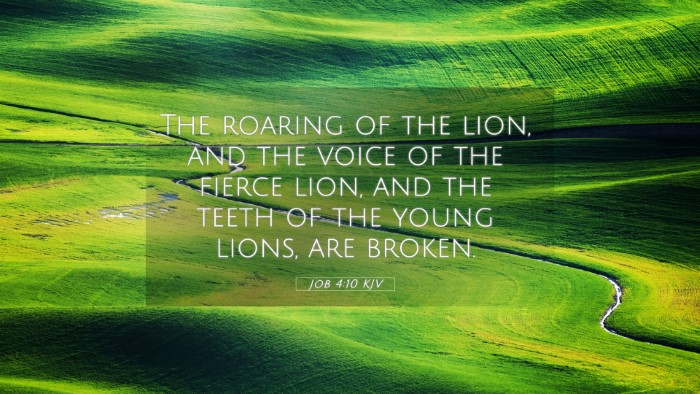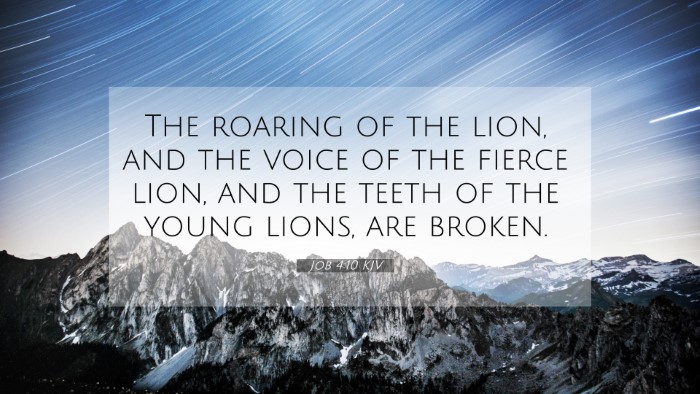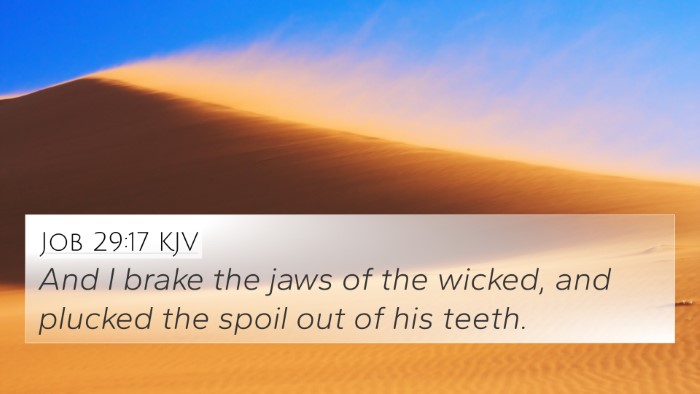Old Testament
Genesis Exodus Leviticus Numbers Deuteronomy Joshua Judges Ruth 1 Samuel 2 Samuel 1 Kings 2 Kings 1 Chronicles 2 Chronicles Ezra Nehemiah Esther Job Psalms Proverbs Ecclesiastes Song of Solomon Isaiah Jeremiah Lamentations Ezekiel Daniel Hosea Joel Amos Obadiah Jonah Micah Nahum Habakkuk Zephaniah Haggai Zechariah MalachiJob 4:10 Similar Verses
Job 4:10 Cross References
The roaring of the lion, and the voice of the fierce lion, and the teeth of the young lions, are broken.
Uncover the Rich Themes and Topics of This Bible Verse
Listed below are the Bible themes associated with Job 4:10. We invite you to explore each theme to gain deeper insights into the Scriptures.
Job 4:10 Cross Reference Verses
This section features a detailed cross-reference designed to enrich your understanding of the Scriptures. Below, you will find carefully selected verses that echo the themes and teachings related to Job 4:10 KJV. Click on any image to explore detailed analyses of related Bible verses and uncover deeper theological insights.

Psalms 58:6 (KJV) »
Break their teeth, O God, in their mouth: break out the great teeth of the young lions, O LORD.
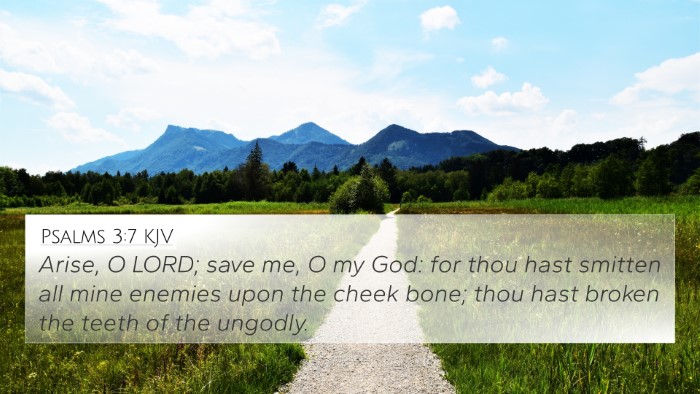
Psalms 3:7 (KJV) »
Arise, O LORD; save me, O my God: for thou hast smitten all mine enemies upon the cheek bone; thou hast broken the teeth of the ungodly.
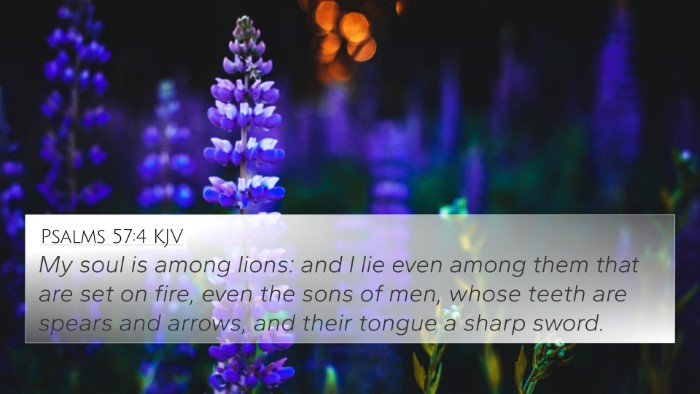
Psalms 57:4 (KJV) »
My soul is among lions: and I lie even among them that are set on fire, even the sons of men, whose teeth are spears and arrows, and their tongue a sharp sword.
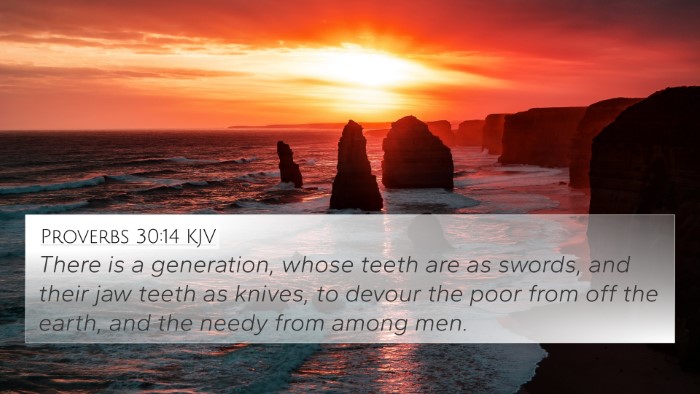
Proverbs 30:14 (KJV) »
There is a generation, whose teeth are as swords, and their jaw teeth as knives, to devour the poor from off the earth, and the needy from among men.
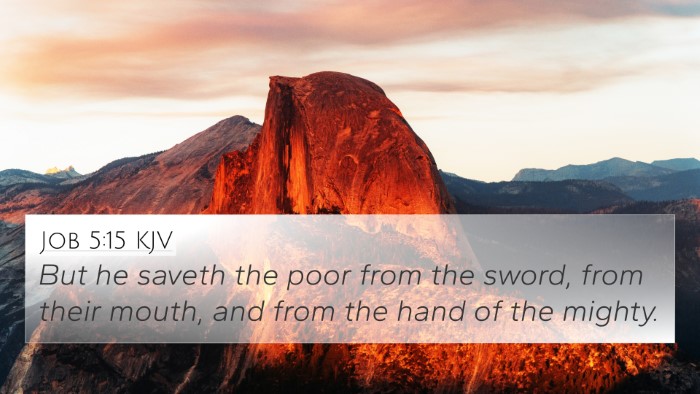
Job 5:15 (KJV) »
But he saveth the poor from the sword, from their mouth, and from the hand of the mighty.
Job 4:10 Verse Analysis and Similar Verses
Understanding Job 4:10
Job 4:10: "The lions have roared, and the young lions have hissed; and the voice of the fierce lion is found no more."
Summary of Job 4:10
The verse captures the essence of loss and silence after a period of ferocity, representing the calming of strong adversaries or calamities. This imagery is expressed vividly through the metaphor of lions – powerful and once fearsome creatures, now composed and silent.
Commentary Insights
Matthew Henry: Matthew Henry notes that the reference to lions symbolizes those once mighty and fierce, now subdued. He elaborates that this serves as a reminder of the transience of strength and how pride can be humbled. The imagery of roaring signifies tumult and strife, which eventually yields to peace.
Albert Barnes: Albert Barnes emphasizes the context of Job's suffering. In his interpretation, the lions represent adversities or hardships that once dominated Job’s life, indicating that they have now ceased. This cessation brings a reflective pause, suggesting that after trials, a sense of calm and stillness follows, which allows for contemplation and understanding.
Adam Clarke: Adam Clarke adds to this by suggesting that the silence of the lions denotes the end of conflicts and worldly troubles. He implies that while the noise of struggle may be frightening, its cessation offers a moment to assess one's predicament and encourages recovery from turmoil.
Related Bible Cross-References
- Proverbs 30:30: "The lion, which is strongest among beasts, and turneth not away for any;" - Connects with the strength symbolism.
- Isaiah 31:4: "For thus hath the Lord spoken unto me, Like as the lion and the young lion roaring on his prey..." - Alludes to the motif of lions representing strength.
- Amos 3:8: "The lion hath roared, who will not fear? The Lord God hath spoken, who can but prophesy?" - Enhances the idea of a roaring lion signifying God's call and powerful message.
- Revelation 5:5: "And one of the elders saith unto me, Weep not: behold, the Lion of the tribe of Juda, the Root of David, hath prevailed..." - This establishes a connection with Christ's triumph over adversities.
- Hebrews 10:37: "For yet a little while, and he that shall come will come, and will not tarry." - Implies waiting for resolution after tumult.
- Psalms 104:21: "The young lions roar after their prey, and seek their meat from God." – Reflects on the relationship of wildness and the dependence on divine provision.
- Psalms lion's like the actions of impact follow stillness.
Thematic Connections
This verse falls within numerous thematic connections that explore the nature of suffering, strength, and resolution. Its inclusion alongside other "lion" metaphors across scripture can lead to a deeper understanding of biblical illustrations surrounding power dynamics, both human and divine.
Comparative Bible Verse Analysis
When undertaking a comparative Bible verse analysis, it's essential to explore how themes of strength and vulnerability reflect across both Old and New Testament texts. For example, contrasting Job's moment of quiet with the lion imagery in Revelation provides a prism through which to view God's sovereignty over both chaos and order.
Scriptural Cross-Referencing Tools
Utilizing cross-referencing Bible study methods can unveil correlations beyond mere direct connections. By examining themes such as perseverance in the face of adversity, one can link Job's experiences with New Testament examples of overcoming through faith.
Conclusion
Job 4:10 serves not only as a powerful narrative of loss and calm but also as an intersection of various scriptural themes. Understanding its meaning through public domain commentaries enriches one’s interpretation, offering a broader perspective on the interplay between strength and silence, adversity and peace.
